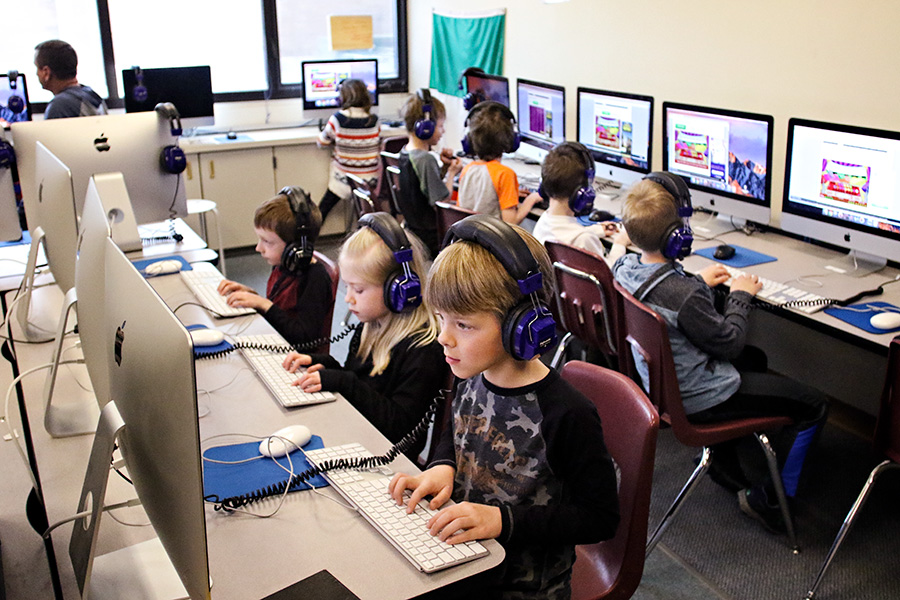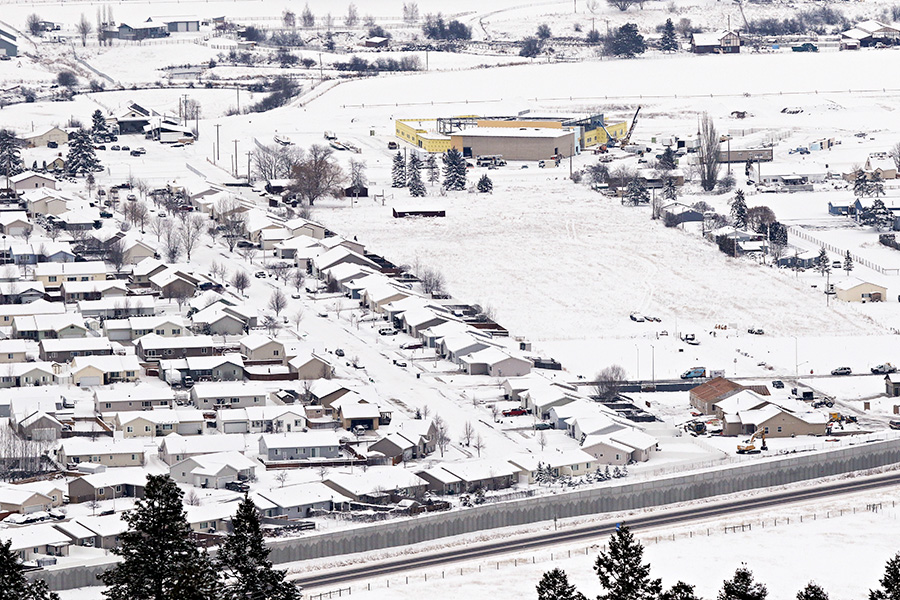The state’s budget crisis led to funding reductions for public education at last year’s Legislature, forcing school districts across Montana to dip into reserve funds, float levies, make cuts and generally scramble to fill in the gaps.
“Less revenue at the state level impacts every school district across the state,” said Kirk Miller, executive director of School Administrators of Montana in Helena.
In the Flathead Valley, five districts — Kalispell, Whitefish, Columbia Falls, Bigfork and West Valley — are preparing to ask voters to approve general or tech levies, prompted or exacerbated in varying degrees by the state budget cuts.
Levies differ from bonds. A general fund levy, also known as an operational levy, is used for day-to-day operations, while a technology levy is used specifically for tech-related needs. Bonds, like those approved by voters in several local districts over the last two years, are strictly used for construction and infrastructure, meaning they provide no funds for basic expenses such as textbooks, curriculum, staff and daily classroom needs.
The reduction in state funding comes at a particularly inopportune time for Kalispell’s district, which is in the process of opening a new elementary school, funded by a bond passed in October 2016. The district is also experiencing sustained enrollment growth, as are other districts in the valley.
Rankin Elementary School will open in south Kalispell in the fall. The brick-and-mortar infrastructure will be in place and paid for through the bond, but numerous other components necessary for opening a school — books, equipment for physical education and music, supplies such as pencil sharpeners, snow removal — must be funded through different sources. Rankin’s incoming principal says it costs $80,000 just to stock a new library with books.
The district is receiving roughly $600,000 to $700,000 less in state contributions this year than in past years, and will continue to see reduced funding next year. The district also faces increased costs for its self-funded health insurance program, due to rate and premium increases, an uptick in participation and underestimated cost projections, including for a number of large claims. The district took out a $725,000 loan to help cover the rising expenses.

Kalispell school officials spent months combing through thousands of line items in the district’s budget, identifying potential cuts. Ultimately, officials outlined $676,800 in elementary district cuts over a two-year period and $866,291 in cuts to the high school district. The district also dipped into reserve interlocal funds.
Still left with a shortfall following those moves, school officials say their last option was to move forward with a $1 million elementary operational levy on May 8.
School officials and advocates say the failure of the levy would hurt the district’s ability to maintain its current level of education throughout its elementary schools and sufficiently stock Rankin with supplies, as well as lead to layoffs.
“We’re going to lose people if this levy doesn’t pass; we’re going to lose staff,” said Deb Burfeind, a guidance counselor at Kalispell Middle School. “From my point of view being a counselor — there’s a ton of research behind this — adult relationships with students are very important. If we lose people, we’re going to lose the ability to reach out and help kids.”
Merisa Murray, the principal at Edgerton Elementary School who will become the principal at Rankin, points out that the opening of the new school won’t require additional staff. Rather, school personnel will be shuffled and staff from the five current elementary schools will transfer, although the levy funds would assist with maintaining staff levels.
Edgerton, for example, will lose 22 staff members either to retirement or transfer, but the school will be able to operate with lower personnel numbers because Rankin is absorbing a portion of its students.
“I feel really proud that we haven’t had to hire new staff for Rankin,” Murray said.
The need for a new elementary is on full display at Edgerton, which has a capacity of 550 students but currently has 621 students and has routinely been running at or over capacity in the 11 years Murray has been assistant principal and principal. “Super” classes of 35 or so students packed into one room have become routine.
The addition of Rankin and redistribution of students will allow Edgerton and other schools to return to under-capacity, solving for now the overcrowding problems that have long plagued the elementary district. But staffing questions remain. If the levy doesn’t pass, Murray worries about the fate of specialists, including music, technology and physical education teachers.
One such specialist, Sean Kelly, a technology instructor at Edgerton, teaches a class that Murray says is a favorite among students. Kids learn about 21st century skills such as robotics and programming.
“All schools have put money toward technology and pushed hard for technology,” Kelly said. “All the things we’ve been pushing hard for all these years, these programs are the first to get cut if a levy doesn’t pass.”
While some districts in Montana float general fund levies annually as a matter of routine and operate at maximum budget, Kalispell hasn’t passed an operational high school levy since 2007 and elementary since 2012, and is annually well under maximum budget.
“We wait until we absolutely need it,” Murray said.

School officials recognize that asking for any raise in property taxes is difficult, particularly on the heels of the bond package, and they hope support for public education and a recognition of the district’s pressing needs and circumstances will ultimately win out. The levy would also help fund special education, curriculum updates and safety improvements.
“We want to keep up with the 21st century,” Murray said. “We have to have the right technology and training. It costs money for kids to get a high-quality education. We have to pass the levy to continue doing all the great things we’ve been doing.”
Bigfork and Columbia Falls are both floating the first technology levies in their districts’ histories. Bigfork Superintendent Matt Jensen says the district previously had access to payments from a technology and flex account, but the Legislature eliminated both of those funds.
The Bigfork district is sending out ballots this week for a pair of 10-year technology levies — one each for high school and elementary — that would provide funds to upgrade aging computers, improve cyber security and address other needs.
More than 75 percent of student computers and 80 percent of staff computers are from before 2011, Jensen said, while most computers in the elementary school are no longer supported for security updates. Jensen also said smartboards throughout the elementary are reaching the end of their lives, the school doesn’t have gigabit Ethernet and nearly every iPad in the district is obsolete as well.
“Most people have had several phone upgrades in the last 10 years, and the same needs are true for schools,” Jensen said. “We’re trying to run educational software that the machine just can’t handle, which limits what we can do instructionally with it. The technology becomes obsolete; software updates aren’t available.”
Cal Ketchum, West Valley School superintendent, said his district hasn’t floated a general fund levy since 2007. Continually expanding enrollment is a major reason behind the levy, but the state cuts have intensified the need. West Valley has grown from 364 students to 630 since 2007, with corresponding growth in personnel.
“The cuts didn’t affect us as much as in Kalispell,” Ketchum said. “But any time you get money taken away, it doesn’t help.”
Columbia Falls is seeking $485,000 to upgrade technology in its elementary district. Superintendent Steve Bradshaw said the district’s interactive whiteboards are 10 years old, and Business Manager Dustin Zuffelato said other needs include upgrades to broadband connectivity, networks, software and more. As educational models increasingly turn digital, the district’s ultimate goal is to put a device in each student’s hands.
Columbia Falls has never had a specific technology budget and instead has relied on leftover funds, an unsustainable piecemeal approach.
“To keep everything up and running has become more and more difficult,” Bradshaw said. “We know how fast technology is moving, and we need to train kids on the safe use of technology and get them the equipment they’re going to need to keep pace with the rest of the world.”
“It’s my hope,” he added, “that we’re able to get the community to see the importance of this.”
Bradshaw understands frustration over higher tax bills, acknowledging the impact of rising property valuations, but said insufficient support from the state and federal governments often leaves districts with no other option as they try to give the next generation the tools it needs to succeed. When education slips, he said, far greater unintended societal costs are ultimately incurred.
“It costs money at the start, but it’s a good investment in the future of our country, not just for our kids, but for our country,” he said.
Whitefish is holding an election for a general fund levy for its elementary district to keep up with growing enrollment. Whitefish floats operational levies more routinely than some other local districts, and Danelle Reisch, the district’s business director, characterized the impact of state budget cuts as “significant, but not devastating.”

Lance Melton, executive director of the Montana School Boards Association, said despite the immediate increased burden on taxpayers following the Legislature, relief is on the way. When the Legislature dissolved a general fund block grant, thereby eliminating a large pot of money, it also established a mechanism for the state to provide phased-in property tax relief over a four-year period. That will help many counties in the next few years, including Flathead.
“Schools seeking approval of their voted levies are saddled with the tax-policy decisions made by the 2017 Legislature,” Melton said. “But it’s really short-term pain followed by long-term gain.”
Considering the state’s $227 million budget shortfall, Melton said the Legislature “did a reasonable job of finding a balanced solution.”
“I’m not saying it’s not tremendously challenging for our schools,” he added. “But I think it’s part of a shared challenge they’re facing across the state.”
Still, Bradshaw would like to see government place higher priority on education rather than shifting the burden onto local districts and taxpayers, which is a longtime bone of contention within his district and many others around Montana.
Before Bradshaw became superintendent, Columbia Falls’ school district filed a landmark lawsuit against the state in 2002 over public education funding, with both a district court and the Montana Supreme Court agreeing in 2004 that the state was falling short of its constitutional duty. That decision echoed a 1988 court ruling that concluded state education funding wasn’t equitable and pushed too much of a burden onto local taxpayers. The court rulings led to a series of reforms but didn’t quell all of districts’ concerns.
“The most critical job our government has to do is educate our people,” Bradshaw said. “Our democracy is based on being educated and educating our people. If we want to keep our place in the world, we need to educate our kids.”
Difference Between Levy and Bond
Kalispell Motto: “B”ond is for “B”uilding, “L”evy is for “L”earning
Bond: A school district floats a bond to fund brick-and-mortar construction and infrastructure needs, either for renovations to existing facilities or to build new ones. The dollars can’t be used for everyday operational expenses.
Levy: A school district floats a general fund or operational levy to fund day-to-day costs, including personnel, books, curriculum and classroom supplies. There are also other types of levies used for specific purposes, such as a tech levy that funds technology-related needs.
Flathead County Levies
•Kalispell is floating a $1 million general fund levy for its elementary district. The levy comes on the heels of school officials outlining $676,8000 in cuts to the elementary district over a two-year period, in response to a budget shortfall primarily caused by state budget cuts and rising health-care costs. The levy would help fund day-to-day operations throughout the district and stock the new Rankin Elementary School, which will open in the fall. The district was originally planning to conduct an all-mail election, but an email issue with the Secretary of State’s office forced a switch to a traditional poll election. Absentee ballots are mailed out this week and due back May 8. All other registered voters can take advantage of early voting by going to district offices at 233 First Ave. E. until May 7. The final opportunity to vote is on May 8 at the Flathead County Fairgrounds’ Country Kitchen. Tax bills on a $200,000 home would increase $50.38 annually, or $4.20 per month.
•Columbia Falls is floating a $485,000 technology levy for its elementary district to update aging or outdated technology throughout the district. While the funds would address a range of technology, the need was in part brought into focus by last fall’s cyber attacks that infiltrated the district’s server and obtained personal information. Tax bills will increase by about $43 annually, or $3.60 per month, on a $200,000 home. Voting takes place on May 8 at Glacier Gateway Elementary at 440 Fourth Ave. W.
•Bigfork is floating a pair of 10-year technology levies, one each for high school and elementary, to address aging or outdated technology. The district has never requested a tech levy before. The superintendent said the district previously had access to a state technology and flex account, but the state eliminated those funds last year. The taxpayer impact on the $150,000 elementary levy would be a $14.13 annual increase and a $7.54 annual increase for the $100,000 high school levy on a $200,000 home. Because other district taxes are decreasing, however, the net result for taxpayers in the elementary district would be a $9.17 annual decrease and less than a dollar increase in the high school district. Ballots are mailed out this week and due back by May 8.
•West Valley is floating its first general fund levy since 2007 to keep up with growing enrollment and help make up for state budget cuts. The $149,691 levy would address curriculum, staff professional development, classroom furnishings and supplies, the hiring of a new second grade teacher, a loan to purchase new computers for students and more. Taxpayers would see an annual increase of $42.71, or $3.56 per month, on a $200,000 home. Ballots are mailed out April 20 and due back May 8.
•Whitefish is floating a $95,000 general fund levy for its elementary district. The levy funds would support day-to-day operations within the district and help the district keep pace with growing enrollment. Taxes on a $200,000 home would increase roughly $4.50 per year. Voting takes place on May 8 at the district’s board room at 600 E. Second St.
Flathead County Bonds
•Deer Park School, the oldest continually operating school in Flathead County, is running the only bond election. The district is seeking $1.85 million to address aging and outdated infrastructure. The taxpayer impact would be $180 annually, or $15 per month, on a $200,000 home. Ballots are mailed out May 3 and due back May 22. A previous $3 million bond failed last fall.
Contested Flathead County Trustee Elections
•Columbia Falls has five candidates running for two open seats. One seat is vacated by a departing trustee, while board chair Jill Rocksund is running to defend her seat. Joining Rocksund are Michael W. Nicosia, the former district superintendent, Jonathan Ryan Foust, Bruce W. Crockett and Kyle Robert Inman Rosas.
•Whitefish has three candidates running for two open seats. Betsy Kohnstamm is running against incumbents Ruth Harrison and Marguerite Kaminski.
